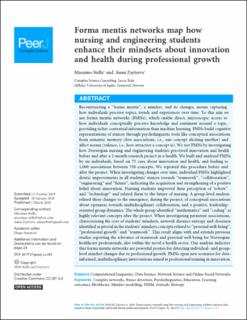| dc.description.abstract | Reconstructing a "forma mentis", a mindset, and its changes, means capturing how individuals perceive topics, trends and experiences over time. To this aim we use forma mentis networks (FMNs), which enable direct, microscopic access to how individuals conceptually perceive knowledge and sentiment around a topic, providing richer contextual information than machine learning. FMNs build cognitive representations of stances through psycholinguistic tools like conceptual associations from semantic memory (free associations, i.e., one concept eliciting another) and affect norms (valence, i.e., how attractive a concept is). We test FMNs by investigating how Norwegian nursing and engineering students perceived innovation and health before and after a 2-month research project in e-health. We built and analysed FMNs by six individuals, based on 75 cues about innovation and health, and leading to 1,000 associations between 730 concepts. We repeated this procedure before and after the project. When investigating changes over time, individual FMNs highlighted drastic improvements in all students' stances towards "teamwork", "collaboration", "engineering" and "future", indicating the acquisition and strengthening of a positive belief about innovation. Nursing students improved their perception of "robots" and "technology" and related them to the future of nursing. A group-level analysis related these changes to the emergence, during the project, of conceptual associations about openness towards multidisciplinary collaboration, and a positive, leadershiporiented group dynamics. The whole group identified "mathematics" and "coding" as highly relevant concepts after the project. When investigating persistent associations, characterising the core of students' mindsets, network distance entropy and closeness identified as pivotal in the students' mindsets concepts related to "personal well-being", "professional growth" and "teamwork". This result aligns with and extends previous studies reporting the relevance of teamwork and personal well-being for Norwegian healthcare professionals, also within the novel e-health sector. Our analysis indicates that forma mentis networks are powerful proxies for detecting individual- and grouplevel mindset changes due to professional growth. FMNs open new scenarios for datainformed, multidisciplinary interventions aimed at professional training in innovation. | en_US |

